Short Answer: Yes! Long Answer: Maybe…
The short answer to your question is Yes! Labradors can eat cheese because they can eat just about everything.
The real point is whether they should eat cheese.
The catch with the answer yes, is that you should avoid feeding your Labrador large quantities of cheese or other dairy products since larger quantities can seriously mess up their gut system.
The safest way to feed labradors’ cheese would be low-lactose (or even lactose-free) cheese.
This would remove any guesswork of safety, but even then there should be safety precautions taken as a lot of it depends on your labrador specifically (Don’t Worry, we’ll give signs later on in this article if whether or not Cheese would be dangerous for your Labrador Specifically!)
Can Labradors Eat Cheese? Cheese and dairy products as a whole are difficult for dogs to digest as opposed to humans. And that’s because Labradors do not possess large amounts of lactase to comfortably digest cheese.
So if Cheese is consumed in bulk by your dog, this can lead to symptoms like vomiting, diarrhea, gas, etc. They do possess some which allow them to eat cheese but not in excess quantities.
A good rule would be to feed cheese to your labrador as only a treat with a specific quantity (just don’t go over that quantity and you should be fine!)
However, keep in mind that not all Cheese is created equally as treats for your furry friend. Some cheeses should be avoided completely while other types of Cheese can make up for great treats.
We’ll cover the ones that need to be COMPLETELY avoided and also whether or not cheese or dairy products as a whole should be avoided for your labrador specifically.
There are also certain ingredients that are within certain cheeses to add flavor that are good for us but should be avoided at all costs for your labrador.
Realize that Cheese is not necessarily an essential part of your labrador’s diet, but there are certain uses that can make it a good idea to gradually add it to your Lab’s diet.
Benefits of Eating Cheese For Your Labrador
Cheese should not be a large part of your Labrador’s diet. Realize that Dogs and Labradors specifically love cheese, and you should take advantage of that in certain scenarios.
There should only be some instances or uses where Cheese should be fed:
The first way would be through a bait. If for example, you need to feed your dog medicine, you can trickle it down a cube of cheese so your dog can benefit from the medicine without having to fight him to do so.
The second would be a treat. If your teaching you labrador a trick or a skill, you can give it a cube of cheese every time it performs well.
This will make it easier for you to teach your dog skills and tricks while giving your labrador a worthwhile goal to work towards. (This use may be especially effective towards older dogs and get them to learn new tricks!)
As for training treats specifically, cubes of cheese would be most ideal. Keep in mind however the number of cubes you’re feeding your labrador in a day.
Having a set quantity and not going over that will be key to feed your labrador cheese safely. With these specific uses, you need to remember to take the instances of a worst-case scenario.
You need to keep in mind that at the end of the day, labradors and all dogs, in general, have a sensitive stomach and leaning more towards the safety side whether it be for treats or feeding medicine would be ideal to ensure safety.
And if you’re just starting to introduce these uses of cheese into your Dog’s diet, you need to do so slowly. With every new addition to your dog’s diet (specifically with dairy), you need to introduce it slowly and gradually.
Maybe start with one cube of cheese on the first day.
Depends on the Type of Cheese
As explained earlier not all cheeses are created equally. So to answer the question “Can Labradors eat cheese?” becomes a more dependent answer on the type of cheese that you’re planning to feed your labrador.
Certain types of cheeses should be completely avoided, largely due to the fact that the lactose content is too high on those for your dog to comfortably digest without any harmful symptoms.
Overall, despite certain types of cheeses not being suited for every labrador. Cheeses do provide nutritional benefits to your labrador to worth noting.
They act as protein, fatty acids, vitamin A, Vitamin B and a bunch of other rich nutritional contents that can benefit your labrador’s growth.
Besides certain cheeses having too high of a lactose content making it harder to digest. Some types of cheeses may have too much sodium which can also be dangerous to feed to your dogs.
Because if you notice on a lot of dog food, the sodium content is relatively low. This is why Cheeses with larger quantities of sodium should be avoided for your labrador at all costs.
You also have to look at whether or not your labrador specifically is lactose intolerant. Because if it is lactose intolerant then only the types of cheeses and dairy products that are lactose-free should be consumed to prevent allergic reactions.
When you are looking for cheeses to feed or treat your furry friend then you need to look for cheeses that A) Low in sodium content and B) Lower Lactose. Types of Cheeses that meet these two criteria would be:
- Cheddar
- Mozzarella
- String Cheese (Be careful though, it can act as a choking hazard so only feed in cubes)
- Swiss
- Cottage (Avoid Cottage cheese that can be cut by milk since it can significantly increase lactose content)
Cheese Types to Completely Avoid For Labradors
There are some cheeses that have no exceptions at all and should be avoided at all costs due to either high sodium or high lactose content or even a combination of both.
Below we have listed the types of Cheeses that your Labrador should always avoid along with certain ingredients that go into add flavor but are very detrimental for your labrador’s health.
1. Avoid Goat Cheese
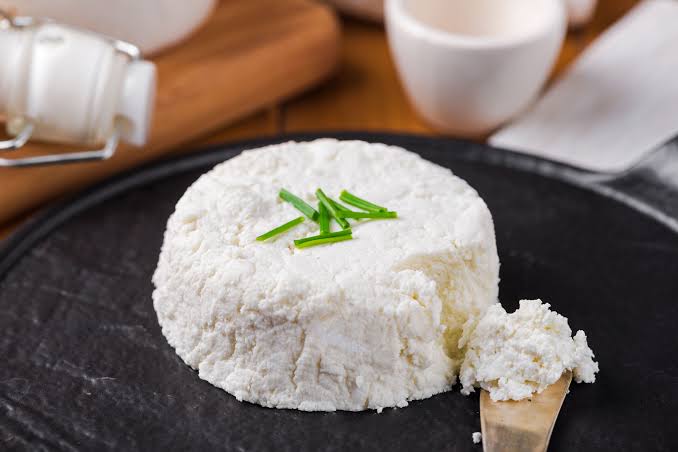
Goat Cheese specifically is higher in Lactose Content which can have negative effects on your Labrador. Compared to cow milk, goat milk is a lot more expensive and difficult to find.
So this is also better for practical and economical reasons as well. Along with that Goat Cheese also has significantly higher contents of saturated fat which makes it very unhealthy for your dog to consume which can lead to a stream of health problems later down the line like pancreatitis.
2. Avoid Parmesan Cheese
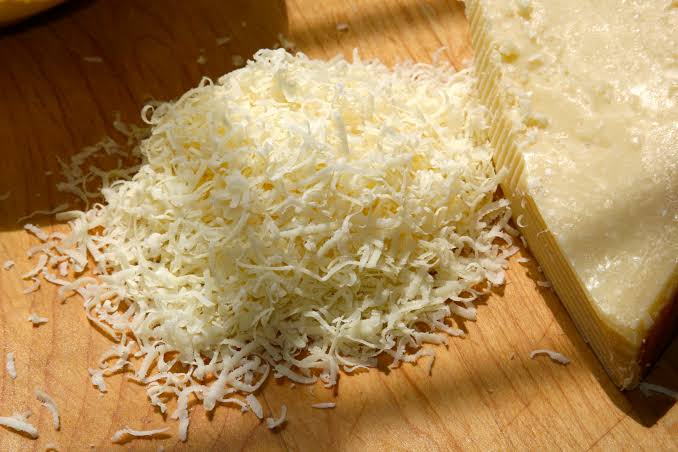
Now Parmesan Cheese is low in lactose content, it has high amounts of sodium. The thing with sodium is that dogs can’t digest sodium as well as humans do.
Too much sodium will to dizziness, vomiting, and dehydration. This is why cheeses with high sodium content should be completely avoided at all costs. So definitely avoid parmesan cheese as a treat for your labrador.
3. Avoid Cream Cheese
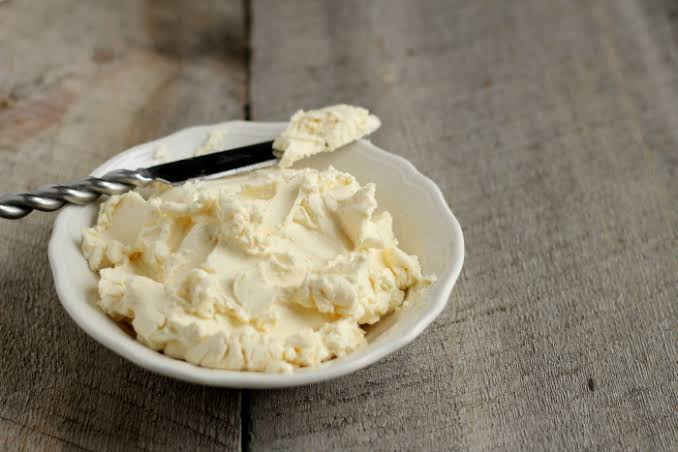
This is the last type of cheese that is a complete no-no for your labrador. Cream Cheese along with parmesan and goat cheese should be avoided as well.
The very high amount of lactose content within the cream is what could make this type of cheese deadly for your dog and lead to a lot of health problems for it.
Alongside that, Cream Cheese has very high amounts of fat which are unhealthy specifically for Labradors since they have the tendency to easily put on weight compared to other dogs in their later ages.
And not to mention, feeding your labrador cream cheese will be a mess in it of itself, so let’s not go there!
4. Avoid Feta Cheese
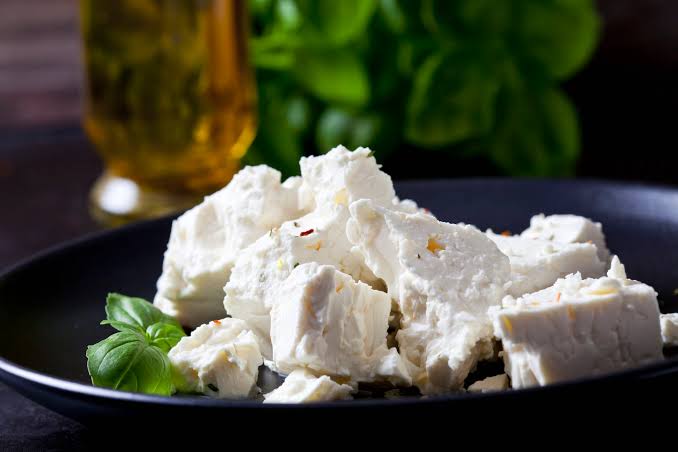
Feta cheese especially contains a very high amount of saturated fat that can be very detrimental for your dog. Even though it may taste very good for us, dogs will have a very difficult time digesting this type of cheese.
Avoiding Feta Cheese will be essential for your dog to live and long and healthy life. High-fat foods as a whole should always be kept away from dogs to avoid future health problems.
5. Avoid Blue Cheese
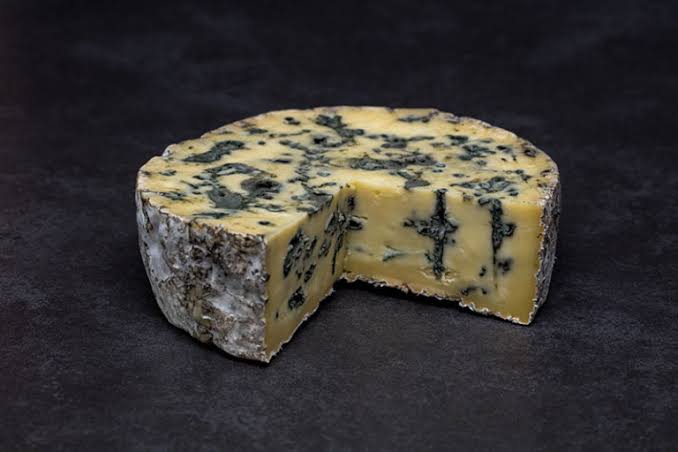
Now Blue Cheese is another one of those types of cheeses that are a must to avoid. Blue Cheese specifically can go ripe very very quickly and produce dangerous toxins for your dog to consume in doing so.
Blue Cheese like feta cheese is also especially high in fat.
Most of these cheeses are found in pizza, so just avoid giving cheese from pizzas as well because those cheeses on pizza tend to have a higher amount of sodium that will not be good for your labrador.
6. Avoid These With Your Cheese
Along with completely avoiding the types of cheeses mentioned above, also avoid Herbs, Tomatoes, and Garlic with your Cheese because these can make your dogs very sick.
In all instances, these three ingredients are served very commonly with cheese and should be avoided at all costs whether it’s with cheese or without.
In fact, some types of cheeses will have ingredients like garlic or onion within the cheese so you won’t be able to tell at all by just looking at it.
So it’s absolutely crucial to look at the ingredients of each cheese label to make sure they don’t include any external flavorings like garlic and onion specifically (they’re very dangerous for dogs)
Won’t They Get An Allergic Reaction to Cheese?
You may have thought that wouldn’t labradors have an allergic reaction to cheese? Now labradors specifically are prone to more allergic reactions to food.
However, dairy products are not toxic to labs and won’t cause an allergic reaction. Despite that, you still need to be aware of potential side effects or allergic reactions your labrador can have with cheese or dairy products as a whole.
The truth is, Cheese isn’t an essential part of your lab’s diet.
And that’s because if you’re feeding it good food, then, either way, it will have had all of its nutritional needs for the day including calcium and vitamin D which are the main important contents with dairy products.
Now you may be wondering what is cheese good for then in a dog’s diet? Take it upon humans ourselves. Why do we reach for that bar of chocolate or soda? To treat ourselves.
So for dogs, cheese would be a great source of a treat after an accomplishment as mentioned earlier.
The main allergic reaction that can be common to your lab if it eats cheese is if it’s lactose intolerant. Lactose intolerance affects dogs as much as humans as well.
And if your labrador is, then you need to be even more careful with the type of cheese that you find.
The types of cheese you would need to look for if this is the case would be lactose-free cheese (and of course, low sodium as well).
However, even if your dog is not lactose intolerant, then it still may be allergic to the proteins found in cow’s milk.
The thing with lactose-intolerance is that there is no medicine that can treat it so lactose-free dairy products are going to be essential.
Without lactase, your dog will simply not be able to digest cheese and that can lead to a lot of problems as mentioned earlier.
This is why it’s very important to get your dog tested for any signs of lactose intolerance or similar issues that can prevent it from consuming cheese or dairy products and also keep in connection with a vet that can help when minutes matter.
Signs For Your Labrador To Not Eat Cheese
Often times, it’s going to be very obvious to tell whether or not your lab is lactose intolerant or not. You really just have to be observant and judge its reactions. If your labrador is lactose intolerant you will be able to tell relatively quickly.
It wouldn’t take that long for you to tell if your labrador is lactose intolerant. If it is, your dog will give you clear signs that its lactose is intolerant. These signs include:
- Gas – This is the MOST common sign or symptom
- Bloating
- Dehydration
- Dizziness
- Diarrhea
- Vomiting
- Abdominal Pains
- Loose Stool
However, do note that it is possible for your labrador to develop these issues later on in its life.
Especially when Labs age they commonly not only gain a lot of weight exponentially but also commonly develop other health-related issues and problems. So be on the lookout for that as your lab ages.
Just because it’s not lactose intolerant at a young age, doesn’t mean it won’t be as it ages to an older dog.
Point being, you should always be aware of your dog’s health and signs it may be giving you regarding its well-being.
Yes Labradors Can Eat Cheese (But There’s An Exception)
Cheese can act as a great treat for your lab. And we all love cheese at the end of the day. However, you must be careful which cheeses should be avoided completely and which ones can serve as an occasional treat for your labrador.
Along with that, understand the allergic reactions that your dog may give off if it’s allergic to cheese/dairy products or lactose intolerant.
If these reactions are common through multiple types of cheese that it would be a good idea to eliminate cheese from your lab’s diet altogether.
A great general rule of thumb would be testing one cheese cube at a time (avoiding the main dangerous ones, however).
Always look at the nutritional ingredients that the Cheese label comes with to avoid any feeding your dog any ingredients that can be harmful to it altogether.
And remember to slowly introduce cheese to your labrador’s diet. You don’t want to rush it in if your dog has never had cheese or other dairy products before.
Main Exceptions For Your Labrador To Not Eat Cheese
The Main exceptions you need to look out for to avoid cheese and other dairy products altogether are:
Number one if your lab is lactose intolerant
If your labrador is showing allergic reactions through multiple types of Cheese
If your labrador is allergic to the proteins within Cow’s Milk
Disclaimer
You should realize that I am not a vet and that any serious concerns should be considered with your Vet.
Having a good relationship with a vet that’s familiar with your labrador specifically would be key to make sure that if there is an Emergency your vet can easily treat your dog by understanding its situation.
Every decision and advice should be considered to your lab specifically. Because just like all humans are different all labradors are different as well. You should be cautious of the reactions your labrador gives specifically.
Conclusion
Be Cautious
If you’re considering adding Cheese to your Labrador’s diet then you should do so cautiously. There can be many different types of reactions that can occur for multiple different types of food.
Cheese is not excluded from them. Though Cheese is not an essential part of a dog’s diet (or any dairy product for that matter) it can act as a great use for medical purposes, as a treat based system for your lab to be more motivated to learn new tricks and skills or even if it’s out of the kindness of your own heart.
You need to realize that every single Labrador can have different reactions or allergies. You need to watch out for your Labrador to not be lactose intolerant.
And the way you can figure that out is by closely observing its reactions with each and every type of cheese. Cheese and dairy products should be avoided altogether if your dog is lactose intolerant or look for lactose-free cheese/dairy products if that is the case for your lab.
Avoid Certain Cheese Types
Make sure to avoid the main cheeses mentioned that are all commonly high in fat, sodium or lactose content. Those cheeses should never be fed to your dog at all costs.
And other Cheeses that should not be fed would be ones with a higher than normal lactose content, sodium or fat.
You need to realize that Labradors specifically out of all dogs are the easiest to put on weight and gain fat (especially when they age) so you need to be especially careful with the fat content your cheese has included.
Along with that, keep an eye out for certain ingredients in Cheeses that can deter it to be unhealthy and bad for your doggo.
Have a Vet
Also remember to consult your vet specifically for if your Labrador can eat cheese or not.
This will give you a “just in case of emergency” to fall back upon if your dog shows any adverse reactions when they eat cheese or any other dairy products.
Introduce It Gradually
Whatever the case you’ve decided to feed your dog cheese, always remember to feed your labrador cheese gradually. When any new food is being introduced to its diet, it should be done slowly.
Also, remember to not feed your labrador with too much quantity of cheese because that will be too difficult for it to digest and can cause a whole list of problems.
A couple of pieces, not every day (like 3 days per week, but max 4 times per week) should do the trick with keeping the quantity at bay.
Labradors are a very unique dog breed so to answer the question if they can eat cheese did get a little complicated.
That’s because adding anything into their diet should be done with precautions and knowledge about what they cope with best and what is detrimental to their health.
And if worst comes to worst, and your dog is not showing the best reactions with the Cheese you feed it, then it should be avoided altogether.
Because as good as cheese is, it’s really not worth the pain and discomfort it could cause your dog if that’s the case with your specific Labrador.
References
- https://onlinelibrary.wiley.com/doi/abs/10.1111/j.1748-5827.2002.tb00058.x
- https://books.google.com/books?hl=en&lr=&id=jGvsDQAAQBAJ&oi=fnd&pg=PT27&dq=Labradors+Dogs+Cheese&ots=5jyJJd_nje&sig=8ydWlB9Ncd05ozLyvEKaEhRGntA
Table of Contents